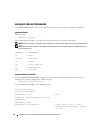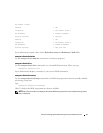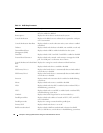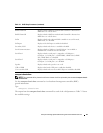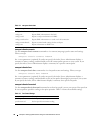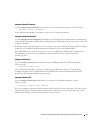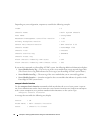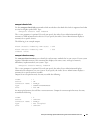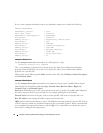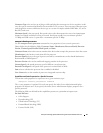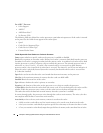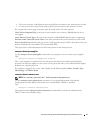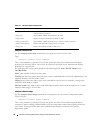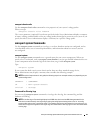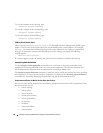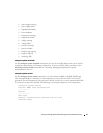
34 omreport: Viewing System Status Using the Instrumentation Service
If your system supports redundant memory, the redundancy output may resemble the following:
omreport chassis nics
Use the omreport chassis nics command to view NIC properties. Type:
omreport chassis nics index=
n
The index parameter is optional. If you do not specify the index, Server Administrator displays
properties about all NICS on your system. If you specify the index, Server Administrator displays
properties for a specific NIC.
Values display for the following fields: Index (number of the NIC card), IP address, Vendor, Description,
and Connection Status.
omreport chassis ports
Use the omreport chassis ports command to view properties of your system’s parallel and serial ports.
Values display for the following fields: Port Type, External Name, Base I/O Address, IRQ Level,
Connector Type, and Maximum Speed.
Port Type is the detailed type of each system port, from the more general serial, parallel, and USB ports to
the names of ports by device type connected to it, for example, pointing device or keyboard.
External Name is the name of the port, such as serial or parallel, USB, mouse, keyboard, and so on.
Base I/O Address is the starting I/O address expressed in hexidecimal.
IRQ Level is a hardware interrupt on a system. The hardware interrupt signals the system's CPU that an
event has started or ended in a peripheral component such as a modem or printer. When communicated
over a peripheral component interconnect card, the IRQ level is a standard way to identify the type of
device that is sending the interrupt request.
Memory Redundancy
Redundancy Status
Fail Over State
Redundancy Configuration
Attributes
Memory Array 1
Attributes
Memory Array 1
Attributes
Memory Array 1
Attributes
Memory Array 1
Attributes
Memory Array 1
: Full
: Inactive
: SpareBank
: Location
: Proprietary Add-on Card
: Use
: Unknown
: Installed Capacity
: 1536 MB
: Maximum Capacity
: 12288 MB
: Slots Available
: 12



